新概念英语青少版三年级下册 Unit 20 There’s always a first time! 课件(60张PPT)
文档属性
| 名称 | 新概念英语青少版三年级下册 Unit 20 There’s always a first time! 课件(60张PPT) |
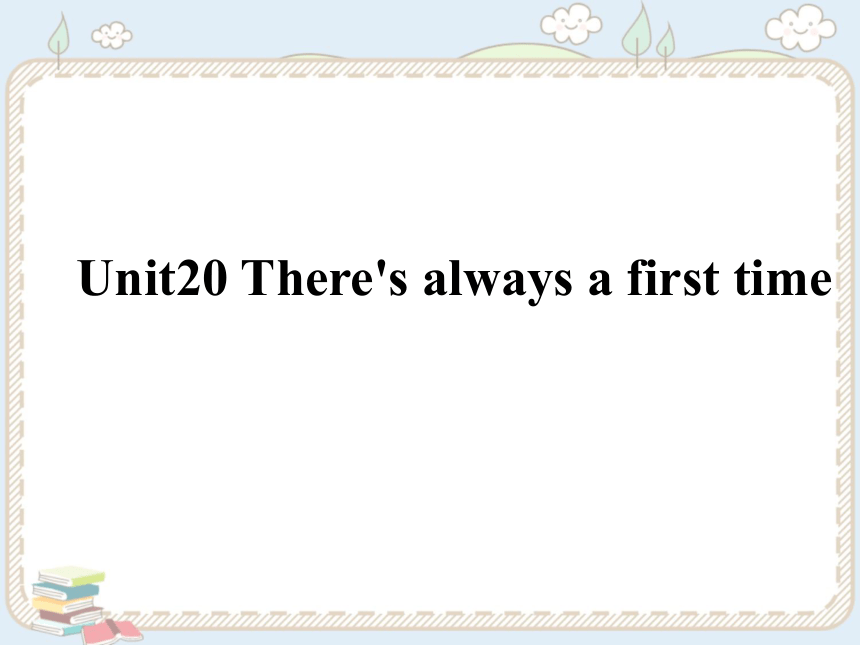
|
|
| 格式 | zip | ||
| 文件大小 | 12.2MB | ||
| 资源类型 | 教案 | ||
| 版本资源 | 新概念英语 | ||
| 科目 | 英语 | ||
| 更新时间 | 2019-06-21 00:00:00 | ||
图片预览

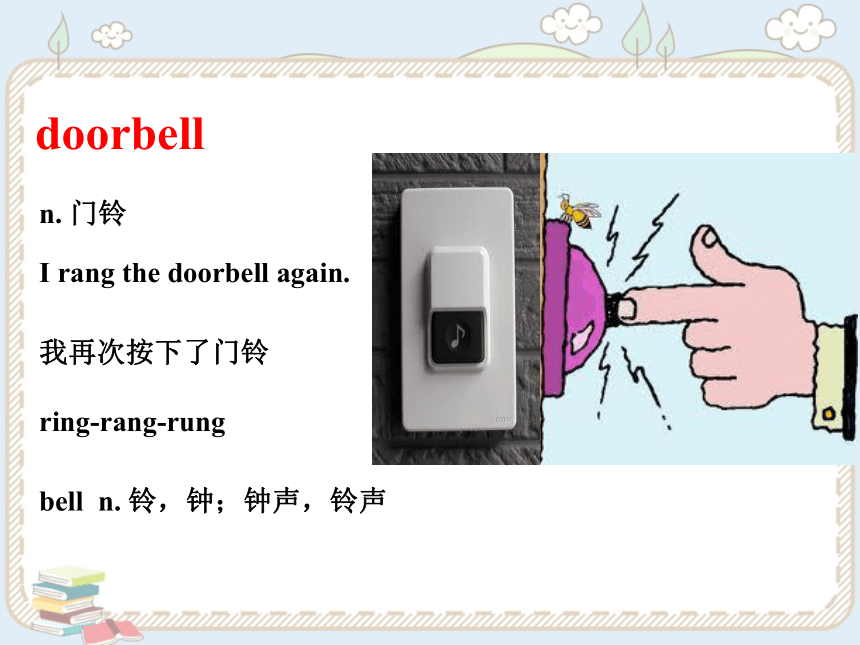
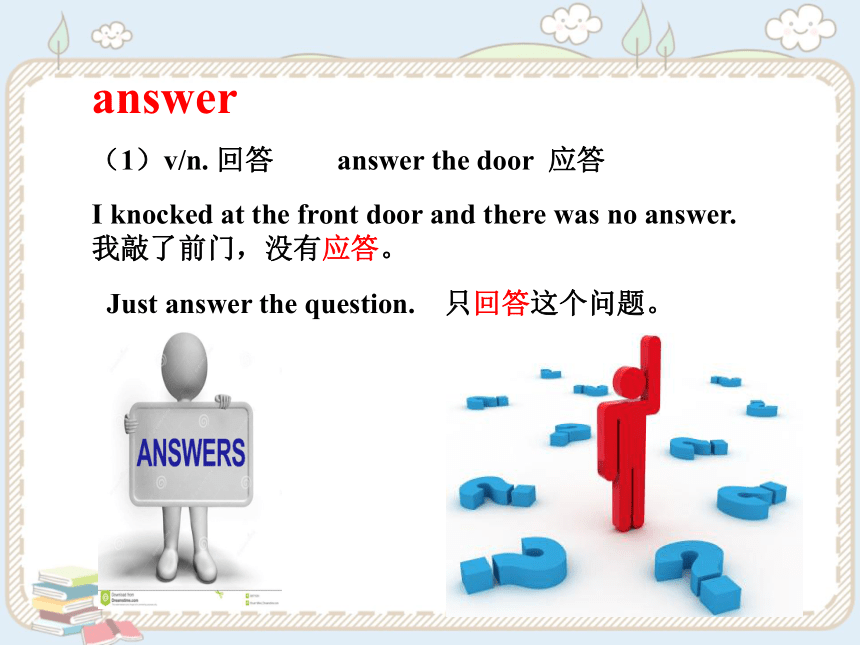


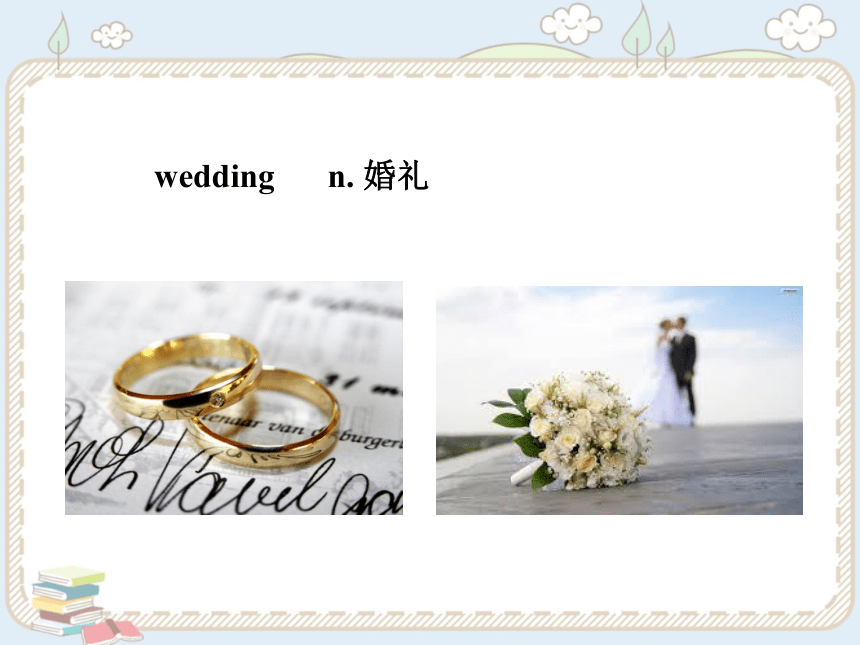



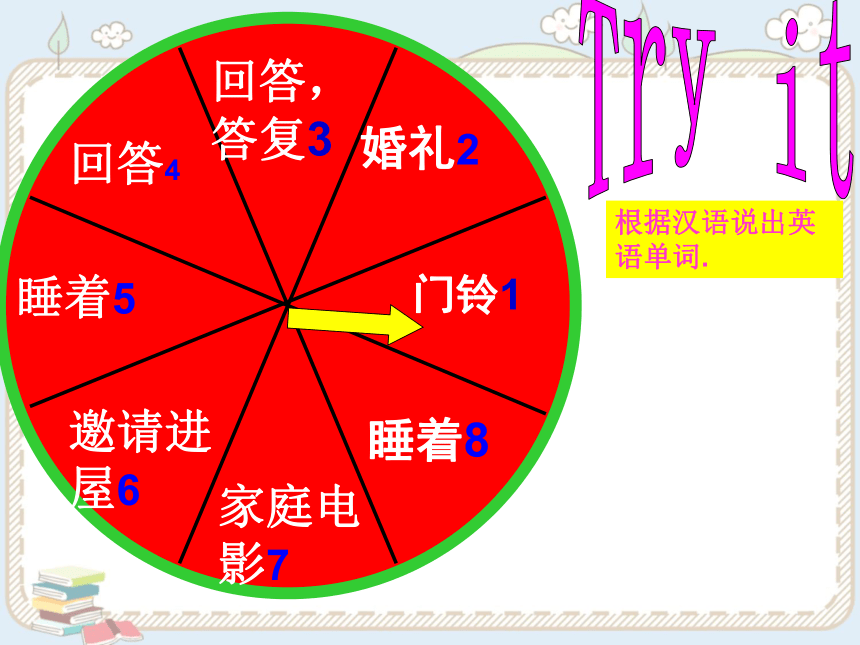
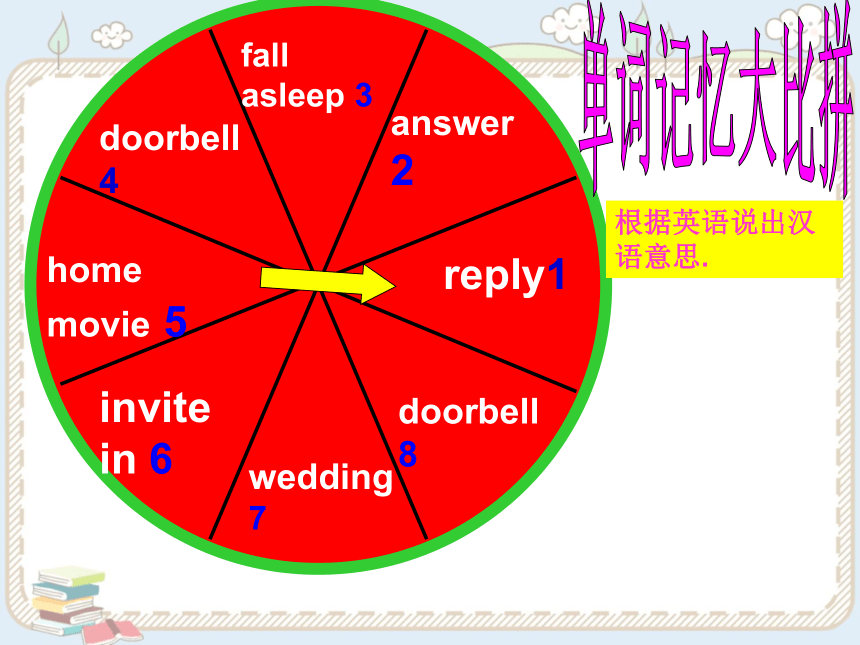

文档简介
课件60张PPT。Unit20 There's always a first time doorbell n. 门铃我再次按下了门铃I rang the doorbell again. ring-rang-rungbell n. 铃,钟;钟声,铃声answer(1)v/n. 回答I knocked at the front door and there was no answer.
我敲了前门,没有应答。answer the door 应答Just answer the question. 只回答这个问题。invite in v. +adv. 邀请进屋快去告诉他们我回来了,请他们进来!Go tell them I am home and invite them in! Invite v.邀请I invite you to read. 我邀请你去阅读。replyv. /n.回复,答复他从来都不回信。He never replied to the letters.
She left for Beijing yesterday.But her reply was new to me.
但是她的回复对我来说是新鲜的。wedding n. 婚礼home movien. 记录家庭活动的电影movie n. 电影;电影院;电影业film n.电影 fall asleep睡着,入睡fall vi. 落下;变成; n. 下降;秋天;瀑布asleep adj. 睡着的;adv. 熟睡地;进入睡眠状态过去式 fell 过去分词 fallen 现在分词 falling"Sometimes I fall asleep here," he said. 他说“有时我会在哪儿睡着。”单词记忆大比拼Try it根据汉语说出英语单词.单词记忆大比拼根据英语说出汉语意思. Listen to the recording and then answer the question:What is Alan going to do for his cousin?
ListeningReadingRead the text and answer the questions.
What does Alice always want?
2. When did she ask Alan to move a piano?
3. Where had he parked the car?
4. Had Alice seen him?
5. What doesn’t Alan want to do?
The textI had just got home the other night ,
when my cousin rang the doorbell.过去完成时
结构:主语+had+动词过去分词概念:发生在过去的过去动作一:had got home动作二:rang the door bell
这两个动作都发生在过去,
先进行的动作(回家)用过去完成时,
后进行的动作用过去时(按门铃)But I had just parked the car outsideI didn’t answer the door动作二:didn’t answer the door动作一:had parked the car Perhaps he had seen me.动作三:had seen me I’m getting married in April. 什么时态?用现在进行时,表示已经安排好的将要做的事情。Be +doing(动词ing )We had already had two cups of tea, when she
said, “I’d like to have a film of my wedding.Already 放在had 与过去分词之间would like to do something. 表示希望做某事I'd like to =I would like to adv. 已经,早已;先前Would like something 想要某事 找出文中含有过去完成时的句子过去完成时past perfect tense过去完成时由had +过去分词构成 表示过去的过去生的动作 构成方式:肯定句: had+动词的过去分词 否定句: had not+ 过去分词一般疑问句:had+ 主语+ 过去分词肯定回答: Yes, 主语+ had.
否定回答: No, 主语+ hadn’t.过去完成时的主要用法
过去完成时表示一个动作或状态在过去某一时间或动作之前已经完成或结束,即发生在“过去的过去”。如:我醒来时,雨已经停了。(主句的动作发生在“过去的过去”)
When I woke up, it had stopped raining. 2. 过去完成时是一个相对的时态,表示的是“过去的过去”,只有和过去某一时间或某一动作相比较时才使用它。如: 他告诉我他写了一本新书。
He told me that he had written a new book. (had written 发生在 told 之前 ) 3. 过去完成时需要与一个表示过去的时间状语连用,它不能离开过去时间而独立存在。此时多与
already, yet, still, just, before, never 等时间副词及 by, before, until 等引导的短语或从句连用。 Grace来中国前在一所学校教了五年英语。
Before she came to China, Grace had taught English in a school for about five years.
Peter十岁时就已经收集了三百多张中国邮票。
Peter had collected more than 300 Chinese stamps by the time he was ten. 4. 过去完成时表示某一动作或状态在过去某时之前已经开始,一直延续到这一过去时间,而且动作尚未结束,仍然有继续下去的可能。如: 到去年为止,他已经在这工厂工作二十年了。
By the end of last year, he had worked in the factory for twenty years. (had worked 已有了 20 年,还有继续进行下去的可能)过去完成时的判断依据:
1. 由时间状语来判定:一般说来,各种时态都有特定的时间状语。与过去完成时连用的时间状语有:
(1) by + 过去的时间点。如:
昨天晚上九点前我已经读完这本小说了。
I had finished reading the novel by nine o'clock last night. (2) by the end of + 过去的时间点。如:
截止到上学期末,我们已经学了两千多个英文单词了。
We had learned over two thousand English words by the end of last term.
(3) before + 过去的时间点。如:
上周三以前他们已经中了六百棵树了。
They had planted six hundred trees before last Wednesday. 2. 由“过去的过去”来判定:过去完成时表示“过去的过去”,是指过去某一动作之前已经发生或完成的动作,即动作有先后关系,动作在前的用过去完成时,在后的用一般过去时。这种用法常出现在:
(1) 宾语从句中: 当宾语从句的主句为一般过去时,且从句的动作先于主句的动作时,从句要用过去完成时。在told, said, knew, heard, thought等动词后的宾语从句。如:
她说她以前看过这电影。She said that she had seen the film before. (2) 状语从句中: 在时间、条件、原因、方式等状语从句中,主、从句的动作发生有先后关系,动作在前的,要用过去完成时,动作在后的要用一般过去时。如:
当我到达车站时,火车已经离开了。When I got to the station, the train had already left.
他完成作业以后,就上床睡觉了。After he had finished his homework, he went to bed. 注意:before, after 引导的时间状语从句中,由于 before 和 after 本身已表达了动作的先后关系,若主、从句表示的动作紧密相连,则主、从句都用一般过去时。如:
你来这儿之前在哪儿学习?Where did you study (had you studied) before you came here?
他关上门,离开了教室。After he closed the door, he left the classroom. (3) 表示意向的动词,如hope, wish, expect, think, intend, mean, suppose等,用过去完成时表示"原本…,未能…"
我们原本希望你会来,但你没来。
We had hoped that you would come, but you didn't. 3. 根据上、下文来判定。
昨天我在街上见到了王涛,自从他来到北京后我们还没见过面。
I met Wang Tao in the street yesterday. We hadn't seen each other since he came to Beijing.He started to learn Englished 5 years ago. 过去时 5 years ago nowHe has learned English for 5 years. 5 years ago has learned now现在完成时have/ has donedid过去完成时Did she go to town?
Yes, she did, but she finished the housework first. Yes, she did, but she'd already phoned a friend before that. had phoned a friend finished housework nowhad done现在过去过去的过去在课本P34, 找出含有过去完成时的句子。I had just got home the other night, when my cousin, Alice, rang the doorbell.But I had just parked the car outside.过去完成时
与
一般过去时
的区别过去完成时与一般过去时的区别1. 时间状语不同.过去完成时在时间上强调“过去的过去”,而一般过去时只强调过去某一特定的时间
They had arrived at the station by ten yesterday.
(说明不到10点就在车站了)
They arrived at the station at ten yesterday.
(说明10点到车站的)2) 在没有明确的时间状语做标志时,谓语动词动作发生的时间先后须依据上下文来判断,先发生的用过去完成时,后发生的用一般过去时.I had finished my homework before my mother came back.在妈妈回来前,我已经把作业写完了。3) 当两个或两个以上的动作用and或but连接时,按时间顺序只需用一般过去时代替过去完成时;另外在引导的从句中由于这些连词本身已经表示时间的先后,因此也可以用过去时来代替过去完成时
He entered the room, turned on the light and read an evening paper.
I (had) called her before I left the office.过去完成时
与
现在完成时
的区别
过去完成时与现在完成时的区别现在完成时表示的动作发生在过去, 但侧重对现在产生的结果或造成的影响,与现在有关. 其结构为”助动词have/has+过去分词”; 过去完成时则是一个相对的时态, 它所表示的动作不仅发生在过去,更强调”过去的过去”,只有和过去的某时或某动作相比较时,才用到它. 到目前为止我已经学会了3000个单词.到那时我已经学会了3000个英语单词.I have learned 3000 English words so far. I had learned 3000 English words till then. 选择填空
( )1.--- “Did you see Tom at the party?”
---“No, Mary told me that he ___ by the time I got there.”
A. left B. was leaving C. had left D. has left
( )2. He said that he ____ his lunch yet.
A. hadn’t had B. hasn’t had C. wouldn’t have D. was having
( )3. By the end of last year we ____ each other for ten years.
A. have known B. knew
C. were knowing D. had known
( )4. I saw Li Lei yesterday.
We hadn’t seen each other ______ I left Beijing.
A. after B. before C. since D. until cA D c( )6. I learned_______ the city for a long time.
she has been in B. she has gone to
C. she had been in D. she had gone to
( )7. He said that he _______ a cold for three days.
A. has B. had caught C. had had D. has got
( )8. I saw Kate with a new radio in her hand yesterday, but she told me she______the radio for ten days.
has bought B. had bought C. has had D. had had
ccD ( )9. The film ______ when I got there.
A. has begun B. had already started C .began D. have already begun
( )10. The film _______ for ten minutes when we got to the cinema.
A. had already been on B. had already begun
C. have already been on D. have already begun
A B Pattern Practice1.做饭
2.入睡,睡着
3.看电视新闻
4.看电影
5.去镇上
6.做完家务
7.做完家庭作业
8.买新车
9.看杂志
10.停车
11.看书
12.去电影院
13.进屋
14.在...之前
15.首先
16.卖旧车
1. cook a meal
2. fall asleep
3. watch the news on TV
4. see the film
5. go to town
6. finishthe housework
7. finish the homework
8. buy a new car
9. read a magzine
10. park the car
11. read the book
12. go to the cenima
13. go indoors
14. before
15. first
16. sell the old carA:Did he/she/they .....?
B:Yes,..., but he/she/they first.
B: Did he/she/they.....?
A: Yes,...,but he/she/they 'd already...before that.phoned a friendcooked a mealDid she cook a meal?
Yes, she did, but she phoned a friend first.Yes, she did, but she'd already phoned a friend before that.在...之前watched the cartoon on TVfell asleepDid he fall asleep?
Yes, he did, but he watched the cartoon on TV first.Yes, he did,
but he'd already watched the cartoon on TV before that.fall-fell-fallenread the booksaw the filmDid he see the film?
Yes, he did, but he read the book first.Yes, he did, but he'd already read the book before that.see-saw-seenfinished the houseworkwent to townDid she go to town?
Yes, she did, but she finished the housework first. 首先go-went-gonesold the old carbought a new carDid he buy a new car?
Yes, he did, but he sold the old car first.Yes, he did, but he'd already sold the old car before that.buy-bought-bought卖买parked his carwent indoorsDid he go indoors?
Yes, he did, but he parked his car first.Yes, he did, but he'd already parked his car before that.go-went-goneread a magzinewrote some emailsDid she write some emails?
Yes, she did, but she read a magzine first.Yes, she did, but she'd already read a magzine before that.write-wrote-writtenfinisheed her homeworkwent to the cenimaDid she go to the cenima?
Yes, she did, but she finished her homework first.Yes, she did,
but she'd already finished her homework before that.go-went-gone
我敲了前门,没有应答。answer the door 应答Just answer the question. 只回答这个问题。invite in v. +adv. 邀请进屋快去告诉他们我回来了,请他们进来!Go tell them I am home and invite them in! Invite v.邀请I invite you to read. 我邀请你去阅读。replyv. /n.回复,答复他从来都不回信。He never replied to the letters.
She left for Beijing yesterday.But her reply was new to me.
但是她的回复对我来说是新鲜的。wedding n. 婚礼home movien. 记录家庭活动的电影movie n. 电影;电影院;电影业film n.电影 fall asleep睡着,入睡fall vi. 落下;变成; n. 下降;秋天;瀑布asleep adj. 睡着的;adv. 熟睡地;进入睡眠状态过去式 fell 过去分词 fallen 现在分词 falling"Sometimes I fall asleep here," he said. 他说“有时我会在哪儿睡着。”单词记忆大比拼Try it根据汉语说出英语单词.单词记忆大比拼根据英语说出汉语意思. Listen to the recording and then answer the question:What is Alan going to do for his cousin?
ListeningReadingRead the text and answer the questions.
What does Alice always want?
2. When did she ask Alan to move a piano?
3. Where had he parked the car?
4. Had Alice seen him?
5. What doesn’t Alan want to do?
The textI had just got home the other night ,
when my cousin rang the doorbell.过去完成时
结构:主语+had+动词过去分词概念:发生在过去的过去动作一:had got home动作二:rang the door bell
这两个动作都发生在过去,
先进行的动作(回家)用过去完成时,
后进行的动作用过去时(按门铃)But I had just parked the car outsideI didn’t answer the door动作二:didn’t answer the door动作一:had parked the car Perhaps he had seen me.动作三:had seen me I’m getting married in April. 什么时态?用现在进行时,表示已经安排好的将要做的事情。Be +doing(动词ing )We had already had two cups of tea, when she
said, “I’d like to have a film of my wedding.Already 放在had 与过去分词之间would like to do something. 表示希望做某事I'd like to =I would like to adv. 已经,早已;先前Would like something 想要某事 找出文中含有过去完成时的句子过去完成时past perfect tense过去完成时由had +过去分词构成 表示过去的过去生的动作 构成方式:肯定句: had+动词的过去分词 否定句: had not+ 过去分词一般疑问句:had+ 主语+ 过去分词肯定回答: Yes, 主语+ had.
否定回答: No, 主语+ hadn’t.过去完成时的主要用法
过去完成时表示一个动作或状态在过去某一时间或动作之前已经完成或结束,即发生在“过去的过去”。如:我醒来时,雨已经停了。(主句的动作发生在“过去的过去”)
When I woke up, it had stopped raining. 2. 过去完成时是一个相对的时态,表示的是“过去的过去”,只有和过去某一时间或某一动作相比较时才使用它。如: 他告诉我他写了一本新书。
He told me that he had written a new book. (had written 发生在 told 之前 ) 3. 过去完成时需要与一个表示过去的时间状语连用,它不能离开过去时间而独立存在。此时多与
already, yet, still, just, before, never 等时间副词及 by, before, until 等引导的短语或从句连用。 Grace来中国前在一所学校教了五年英语。
Before she came to China, Grace had taught English in a school for about five years.
Peter十岁时就已经收集了三百多张中国邮票。
Peter had collected more than 300 Chinese stamps by the time he was ten. 4. 过去完成时表示某一动作或状态在过去某时之前已经开始,一直延续到这一过去时间,而且动作尚未结束,仍然有继续下去的可能。如: 到去年为止,他已经在这工厂工作二十年了。
By the end of last year, he had worked in the factory for twenty years. (had worked 已有了 20 年,还有继续进行下去的可能)过去完成时的判断依据:
1. 由时间状语来判定:一般说来,各种时态都有特定的时间状语。与过去完成时连用的时间状语有:
(1) by + 过去的时间点。如:
昨天晚上九点前我已经读完这本小说了。
I had finished reading the novel by nine o'clock last night. (2) by the end of + 过去的时间点。如:
截止到上学期末,我们已经学了两千多个英文单词了。
We had learned over two thousand English words by the end of last term.
(3) before + 过去的时间点。如:
上周三以前他们已经中了六百棵树了。
They had planted six hundred trees before last Wednesday. 2. 由“过去的过去”来判定:过去完成时表示“过去的过去”,是指过去某一动作之前已经发生或完成的动作,即动作有先后关系,动作在前的用过去完成时,在后的用一般过去时。这种用法常出现在:
(1) 宾语从句中: 当宾语从句的主句为一般过去时,且从句的动作先于主句的动作时,从句要用过去完成时。在told, said, knew, heard, thought等动词后的宾语从句。如:
她说她以前看过这电影。She said that she had seen the film before. (2) 状语从句中: 在时间、条件、原因、方式等状语从句中,主、从句的动作发生有先后关系,动作在前的,要用过去完成时,动作在后的要用一般过去时。如:
当我到达车站时,火车已经离开了。When I got to the station, the train had already left.
他完成作业以后,就上床睡觉了。After he had finished his homework, he went to bed. 注意:before, after 引导的时间状语从句中,由于 before 和 after 本身已表达了动作的先后关系,若主、从句表示的动作紧密相连,则主、从句都用一般过去时。如:
你来这儿之前在哪儿学习?Where did you study (had you studied) before you came here?
他关上门,离开了教室。After he closed the door, he left the classroom. (3) 表示意向的动词,如hope, wish, expect, think, intend, mean, suppose等,用过去完成时表示"原本…,未能…"
我们原本希望你会来,但你没来。
We had hoped that you would come, but you didn't. 3. 根据上、下文来判定。
昨天我在街上见到了王涛,自从他来到北京后我们还没见过面。
I met Wang Tao in the street yesterday. We hadn't seen each other since he came to Beijing.He started to learn Englished 5 years ago. 过去时 5 years ago nowHe has learned English for 5 years. 5 years ago has learned now现在完成时have/ has donedid过去完成时Did she go to town?
Yes, she did, but she finished the housework first. Yes, she did, but she'd already phoned a friend before that. had phoned a friend finished housework nowhad done现在过去过去的过去在课本P34, 找出含有过去完成时的句子。I had just got home the other night, when my cousin, Alice, rang the doorbell.But I had just parked the car outside.过去完成时
与
一般过去时
的区别过去完成时与一般过去时的区别1. 时间状语不同.过去完成时在时间上强调“过去的过去”,而一般过去时只强调过去某一特定的时间
They had arrived at the station by ten yesterday.
(说明不到10点就在车站了)
They arrived at the station at ten yesterday.
(说明10点到车站的)2) 在没有明确的时间状语做标志时,谓语动词动作发生的时间先后须依据上下文来判断,先发生的用过去完成时,后发生的用一般过去时.I had finished my homework before my mother came back.在妈妈回来前,我已经把作业写完了。3) 当两个或两个以上的动作用and或but连接时,按时间顺序只需用一般过去时代替过去完成时;另外在引导的从句中由于这些连词本身已经表示时间的先后,因此也可以用过去时来代替过去完成时
He entered the room, turned on the light and read an evening paper.
I (had) called her before I left the office.过去完成时
与
现在完成时
的区别
过去完成时与现在完成时的区别现在完成时表示的动作发生在过去, 但侧重对现在产生的结果或造成的影响,与现在有关. 其结构为”助动词have/has+过去分词”; 过去完成时则是一个相对的时态, 它所表示的动作不仅发生在过去,更强调”过去的过去”,只有和过去的某时或某动作相比较时,才用到它. 到目前为止我已经学会了3000个单词.到那时我已经学会了3000个英语单词.I have learned 3000 English words so far. I had learned 3000 English words till then. 选择填空
( )1.--- “Did you see Tom at the party?”
---“No, Mary told me that he ___ by the time I got there.”
A. left B. was leaving C. had left D. has left
( )2. He said that he ____ his lunch yet.
A. hadn’t had B. hasn’t had C. wouldn’t have D. was having
( )3. By the end of last year we ____ each other for ten years.
A. have known B. knew
C. were knowing D. had known
( )4. I saw Li Lei yesterday.
We hadn’t seen each other ______ I left Beijing.
A. after B. before C. since D. until cA D c( )6. I learned_______ the city for a long time.
she has been in B. she has gone to
C. she had been in D. she had gone to
( )7. He said that he _______ a cold for three days.
A. has B. had caught C. had had D. has got
( )8. I saw Kate with a new radio in her hand yesterday, but she told me she______the radio for ten days.
has bought B. had bought C. has had D. had had
ccD ( )9. The film ______ when I got there.
A. has begun B. had already started C .began D. have already begun
( )10. The film _______ for ten minutes when we got to the cinema.
A. had already been on B. had already begun
C. have already been on D. have already begun
A B Pattern Practice1.做饭
2.入睡,睡着
3.看电视新闻
4.看电影
5.去镇上
6.做完家务
7.做完家庭作业
8.买新车
9.看杂志
10.停车
11.看书
12.去电影院
13.进屋
14.在...之前
15.首先
16.卖旧车
1. cook a meal
2. fall asleep
3. watch the news on TV
4. see the film
5. go to town
6. finishthe housework
7. finish the homework
8. buy a new car
9. read a magzine
10. park the car
11. read the book
12. go to the cenima
13. go indoors
14. before
15. first
16. sell the old carA:Did he/she/they .....?
B:Yes,..., but he/she/they first.
B: Did he/she/they.....?
A: Yes,...,but he/she/they 'd already...before that.phoned a friendcooked a mealDid she cook a meal?
Yes, she did, but she phoned a friend first.Yes, she did, but she'd already phoned a friend before that.在...之前watched the cartoon on TVfell asleepDid he fall asleep?
Yes, he did, but he watched the cartoon on TV first.Yes, he did,
but he'd already watched the cartoon on TV before that.fall-fell-fallenread the booksaw the filmDid he see the film?
Yes, he did, but he read the book first.Yes, he did, but he'd already read the book before that.see-saw-seenfinished the houseworkwent to townDid she go to town?
Yes, she did, but she finished the housework first. 首先go-went-gonesold the old carbought a new carDid he buy a new car?
Yes, he did, but he sold the old car first.Yes, he did, but he'd already sold the old car before that.buy-bought-bought卖买parked his carwent indoorsDid he go indoors?
Yes, he did, but he parked his car first.Yes, he did, but he'd already parked his car before that.go-went-goneread a magzinewrote some emailsDid she write some emails?
Yes, she did, but she read a magzine first.Yes, she did, but she'd already read a magzine before that.write-wrote-writtenfinisheed her homeworkwent to the cenimaDid she go to the cenima?
Yes, she did, but she finished her homework first.Yes, she did,
but she'd already finished her homework before that.go-went-gone
同课章节目录
- Unit 16 Paul emails home
- Unit 17 I hope he hasn't told her!
- Unit 18 Learning the rules!
- Unit 19 Now is enough!
- Unit 20 There's always a first time!
- Unit 21 A very big cat
- Unit 22 Does anyone still knit?
- Unit 23 Whose mistake?
- Unit 24 No laughing allowed
- Unit 25 Body image
- Unit 26 Daisy gives some advice
- Unit 27 Jonno!
- Unit 28 Monkey business!
- Unit 29 Sparkling ,still or tap?
- Unit 30 we all need to play more
